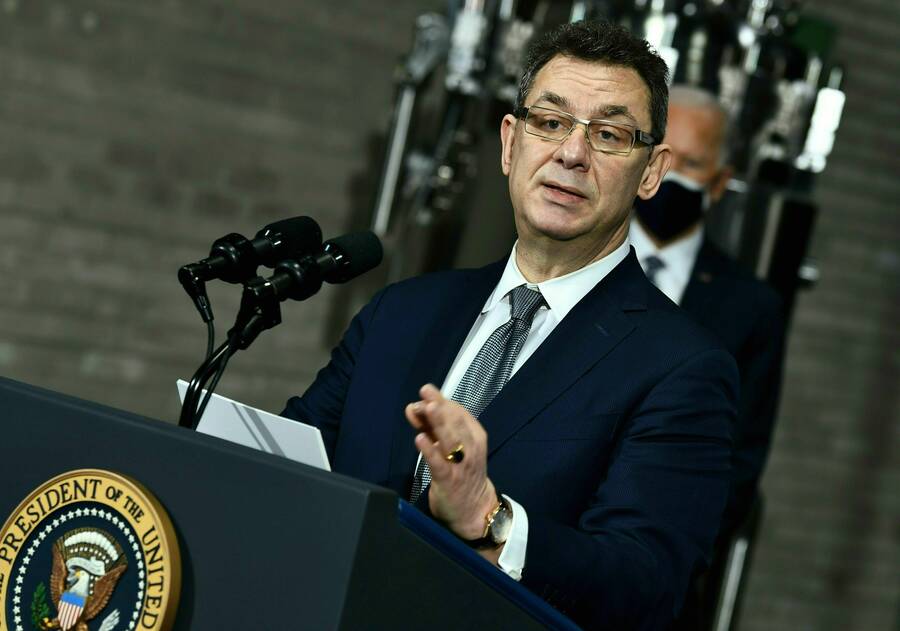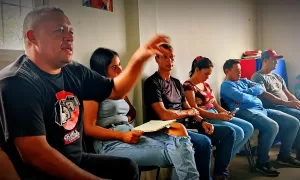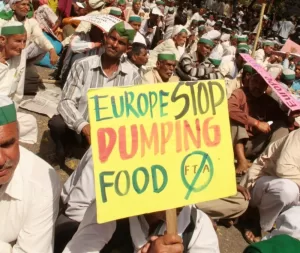❈ ❈ ❈
Big Pharma’s Big Lie About Vaccine Patents
Sarah Lazare and Paige Oamek
Big Pharma has been caught in a lie that implicates not only major Covid-19 vaccine manufacturers, but also heads of state and members of Congress. Tracking how the lie spread, and who spouted it, reveals a great deal about how a for-profit industry, loyal only to its shareholders, is shaping international discourse about humanity’s capacity to save lives during the pandemic.
The lie relates to an October 2020 proposal from India and South Africa that the World Trade Organization suspend enforcement of key patent rules so that cheaper, generic versions of Covid-19 treatments and vaccines can get to more people more quickly. (The proposal is referred to as a TRIPS waiver, a reference to the WTO Agreement on Trade-Related Aspects of Intellectual Property Rights.) The pharmaceutical giants Pfizer and Moderna, concerned with maximizing their present and future profits, emerged as virulent opponents of such a measure, which still has not passed more than a year later, even as just one out of 21 people in poor countries have been fully vaccinated. It is no anomaly that the industry would reject such a proposal — pharmaceutical companies had a big hand in shaping those WTO intellectual property rules in the first place, to protect pharmaceutical monopolies and their profits.
But in order to protect strict intellectual property rules while also protecting its public image, the pharmaceutical industry had to weave a narrative that portrays companies as driven by altruistic motives: the desire to protect innovation and research, and ensure safe and responsible vaccine production. Among talking points about how intellectual property incentivizes creativity, and rewards those who save lives, a key argument has emerged: Sharing vaccine recipes is not the panacea you think it is, because much of the world — i.e. the Global South — lacks the facilities and capacity to produce vaccines in a safe and timely manner. Even if we got rid of all intellectual property rules tomorrow, this would do little to boost immediate global vaccine supply.
Pfizer and Moderna, both of which produce mRNA vaccines, have been purveyors of this narrative, warning of the laborious and time-intensive process of developing the ability to produce mRNA vaccines specifically. “There is no idle mRNA manufacturing capacity in the world. This is a new technology, you cannot go hire people who know how to make mRNA — those people don’t exist,” Stéphane Bancel, chief executive of Moderna, said in May. “Only a few facilities in the world perform some of the critical steps needed to manufacture mRNA vaccines,” industry trade group PhRMA, which represents Pfizer and Johnson & Johnson, asserted in March.
It’s clever messaging, because it has an air of expert knowledge, casting companies as patiently informing activists who are well-intentioned but don’t understand how vaccine production works. It also plays to pre-existing racist assumptions that the Global South does not have pharmaceutical sectors capable of producing quality goods, but must rely on its more sophisticated former colonizers.
But, it turns out, empirical claims can be empirically disproven. On October 22, the New York Times ran a story titled, “Here’s Why Developing Countries Can Make mRNA Covid Vaccines” that identifies 10 different facilities in India, Brazil, Thailand, South Africa, Argentina and Indonesia that are strong candidates for producing mRNA vaccines. “The key criteria include existing facilities, human capital, the regulatory system for medicines and the political and economic climate,” writes journalist Stephanie Nolen. Some of the facilities are already producing other vaccines, or testing or making their own mRNA vaccines. In other words, Global South countries could absolutely start producing Pfizer and Moderna vaccines, if the companies would only tell them how.
Of course, this fact is no great revelation to the countries that house these sectors. After all, it was India and South Africa, with giant pharmaceutical industries, that first brought forward the WTO proposal last fall, which has since garnered support from more than 100 countries. Back in May, well before the New York Times article was published, Indonesia’s health minister, Budi Gunadi Sadikin, said at a World Health Organization event that the country has the capacity to “upscale our vaccine productions to meet regional and global demand.”
But for those with whom the New York Times carries more weight than health ministers in the Global South, the paper’s investigation should have been a stunning revelation. A key talking point against the free sharing of vaccine recipes was premised on a false assertion. This has significant implications for a world where vaccine inequality is playing out on a staggering scale. “Africa has fully vaccinated 77 million people, just 6% of its population. In comparison, over 70% of high-income countries have already vaccinated more than 40% of their people,” the World Health Organization warned ahead of the recent G20 summit. What if this horrific reality is an indicator that our system of vaccine distribution, in which private companies wield monopoly power over vaccine distribution, is fundamentally unjust, and leading to millions of preventable deaths? What if it’s a sign that we have to do exactly what the pharmaceutical industry doesn’t want us to: share vaccine patents, which were enabled by public research and funds in the first place, so that more people can make them?
We don’t have definitive proof that pharmaceutical executives sat in a room somewhere and said, “Let’s deceive the public about the world’s vaccine manufacturing capacity.” But there have been enough activists, scientists, and heads of state pointing out holes in Big Pharma’s narrative to make it highly likely that the industry, at the very least, was aware of challenges to the veracity of its claims. And it was in its interest to ignore them. Remarkably, the industry has shown it would rather build its own facilities from scratch — like the BioNTech facilities in Rwanda and Senegal, which won’t even start construction until mid-2022 — than give Global South countries the ability to produce vaccines themselves.
Big Pharma has not been alone in spinning the narrative that the system of private pharmaceutical monopolies is working just fine. While the Biden administration proclaimed in May that it would reverse the Trump administration’s policy of blocking a patent waiver at the WTO, it has been vague about exactly what kind of patent waiver it does support, and it has so far declined to throw its weight behind the proposal from India and South Africa. Meanwhile, opponents of the TRIPS waiver in Congress are repeating disproven talking points about lack of manufacturing capacity.
Among them are Democrats, including Sen. Chris Coons (D‑Del.), who is known for his close relationship with President Biden. In April, Coons was the keynote speaker at an event for the Center for Strategic and International Studies, a think tank that receives funding from the pharmaceutical industry. “I don’t think that waiving [intellectual property] rights will suddenly enable other countries the ability to ramp up the manufacturing of complex vaccines,” said Coons, who has raked in considerable donations from the pharmaceutical industry, and represents a state that is heavy in this sector. Similarly, Democratic Reps. Scott Peters (Calif.) and Ron Kind (Wis.), who both were among the top 25 recipients of Big Pharma PAC money in the 2020 election cycle, wrote an open letter to Biden in May, just before his WTO announcement, proclaiming that a patent waiver “risks the successes seen to date and provides little to no opportunity for further expansion of vaccines.”
Of course, this false talking point has also been echoed broadly on the Republican side. In just one example, Sen. Mike Crapo (R‑Idaho), ranking member of the Senate Finance Committee, has been criticized for significant donations from the pharmaceutical industry. In May, responding to the Biden administration’s reversal of Trump’s policy at the WTO, Crapo proclaimed, “Today’s announcement that the Administration supports waiving the WTO TRIPS Agreement will not accelerate vaccinations. That is because waiving the intellectual property rights of America’s innovators — which was supported by U.S. taxpayers — will not result in any new manufacturing capabilities in time to respond to the pandemic.”
At bare minimum, these members of Congress should be questioned for trafficking in a false assertion. They should have the names of all of the facilities in the Global South capable of producing mRNA vaccines read to them, and be forced to account for the gulf between their claims and reality.
But such accountability would have to extend much further than Washington. While all 164 members of the World Trade Organization (WTO) must reach a consensus before action is taken, rich and powerful countries like the United States and Germany wield disproportionate power at this body, where negotiations and debates often take place behind closed doors. The countries opposing the TRIPS waiver include the United Kingdom, Norway and Switzerland, along with the European Union. The outgoing German leader Angela Merkel, de facto leader of the EU, has in recent months played the biggest role of all world leaders in obstructing the proposal. She has also espoused false pharmaceutical industry talking points. “The limiting factor for the production of vaccines are manufacturing capacities and high quality standards, not the patents,” Merkel said on May 6, the day after Biden said he would no longer block a patent waiver.
On May 8, three days after Biden made his announcement, French President Emmanuel Macron played down the importance of a patent waiver. “The priority today is not intellectual property — it’s not true. We would be lying to ourselves,” he said. “It’s production.” In June, Macron would go on to declare that he backs a TRIPS waiver. But when it comes to vaccine distribution, every day, week, and month of delay means more lives lost.
It is difficult to imagine a more important issue to get right than the answer to the question of how to get vaccines into as many arms as quickly as possible. Yet, those entrusted with an inordinate amount of power to determine how such distribution happens have been caught trafficking in false assertions about the Global South’s manufacturing ability. That this lie has traveled so far, among so many powerful people, should be an international scandal of the top order, and all those who have trafficked in such a line should — at minimum — have to answer for how they got it so wrong. And it should also sow doubt about Big Pharma’s many other assertions: that innovation can’t happen without intellectual property protections, that “piracy” and “theft” of vaccine research from Russia and China constitute a great threat, and that private companies — accountable only to their shareholders — are the best stewards of such a vital, life-saving supply.
(Sarah Lazare is web editor and reporter for In These Times. Paige Oamek is an editorial intern at In These Times. Courtesy: In These Times, an independent, nonprofit magazine dedicated to advancing democracy and economic justice, informing movements for a more humane world, and providing an accessible forum for debate about the policies that shape our future.)
❈ ❈ ❈
‘Obscene’: Pfizer, BioNTech, and Moderna Are Raking in $3.9 Million in Profits Per Hour
Jake Johnson
Moderna, Pfizer, and BioNTech—the makers of the two most successful coronavirus vaccines—are raking in a combined $65,000 in profits every minute as they refuse to share their manufacturing recipes with developing countries, where billions of people still lack access to lifesaving shots.
According to a new People’s Vaccine Alliance analysis of recent earnings reports, the three pharmaceutical giants have made a total of $34 billion in profits this year, which amounts to roughly $1,083 per second, $64,961 per minute, or $3.9 million per hour.
“It is obscene that just a few companies are making millions of dollars in profit every single hour while just two percent of people in low-income countries have been fully vaccinated against coronavirus,” said Maaza Seyoum of the People’s Vaccine Alliance Africa. “Pfizer, BioNTech, and Moderna have used their monopolies to prioritize the most profitable contracts with the richest governments, leaving low-income countries out in the cold.”
Moderna—a Massachusetts-based company that developed its vaccine with the help of government research and around $10 billion in taxpayer funding—has delivered just 0.2% of its total vaccine supply to low-income countries, the People’s Vaccine Alliance estimates. The coronavirus vaccine is Moderna’s only product on the market.
Pfizer and its Germany-based partner BioNTech—whose vaccine was also helped along by taxpayer money—haven’t done much better than their competitor, sending less than 1% of their supply to poor nations while profiting hugely from sales to rich countries.
“Predominantly, right now, we have already signed orders, and those are with high-income countries,” Pfizer CEO Albert Bourla recently said of coronavirus vaccine sales for next year, blaming poor countries for not ordering shots quickly enough.
“We are negotiating right now with few middle-income countries, and with even fewer low-income countries,” Bourla said.
But public health campaigners argue that bilateral deals and vaccine donations are not sufficient to bring production and distribution into line with global needs. Instead, they say, pharmaceutical giants must relinquish their vaccine recipes and allow qualified manufacturers around the world to produce low-cost generic versions for their populations.
Moderna and Pfizer-BioNTech have thus far refused to do so—and lobbied aggressively against a World Trade Organization proposal to temporarily suspend vaccine patents. Bourla, for his part, has dismissed technology-transfer proposals as “dangerous nonsense.”
“Contrary to what Pfizer’s CEO says, the real nonsense is claiming the experience and expertise to develop and manufacture lifesaving medicines and vaccines does not exist in developing countries,” Anna Marriott, health policy manager at Oxfam International, said in a statement Tuesday. “This is just a false excuse that pharmaceutical companies are hiding behind to protect their astronomical profits.”
“It is also a complete failure of government to allow these companies to maintain monopoly control and artificially constrain supply in the midst of a pandemic while so many people in the world are yet to be vaccinated,” she added.
Facing backlash for fueling massive inequities in vaccine distribution, Moderna on Tuesday announced a deal that will allow the European Union and European Economic Area countries to donate coronavirus vaccine doses that they purchased from the company to COVAX, the World Health Organization-backed vaccination initiative.
The agreement was met with derision from vaccine equity campaigners. “Goodness, how generous,” responded Nick Dearden, director of the U.K.-based advocacy group Global Justice Now. “Most people will simply be astounded that you were stopping them from doing this in the first place.”
“Why don’t you, instead, share your publicly funded vaccine recipe with the WHO?” he added. “That might actually help.”
In a letter to Moderna’s billionaire CEO Stéphane Bancel on Tuesday, a coalition of nearly 90 civil society organizations wrote that “we are in no doubt that most Covid-19 deaths in low-income countries are now avoidable deaths: lives that could be saved were effective vaccines, none more than [Moderna’s], widely available to their populations.”
The groups called on Moderna to transfer its vaccine technology to qualified manufacturers through the WHO to ramp up global vaccine production and to commit to selling its shot to low-income countries at a not-for-profit price.
“So far, only about one million doses of mRNA-1273 have gone to low-income countries and Moderna has shipped a greater share of doses to wealthy countries than any other Covid-19 vaccine manufacturer,” the groups noted. “Our analysis suggests that at scale, a not-for-profit price for mRNA-1273 would be no greater than $3 per dose.”
“Moderna, with the [National Institutes of Health], has developed the world’s most effective vaccine technology, that is also the world’s most exclusive vaccine, out of reach to billions of people,” they added. “This can and must change.”
Peter Maybarduk, director of the Access to Medicines program at Public Citizen—one of the groups behind the letter—said Tuesday that Moderna “lags behind even its recalcitrant Big Pharma counterparts when it comes to offering a dose of compassion to the world in this time of need.”
“The Biden administration and WHO have asked for Moderna’s help, and so far Moderna largely has spurned them, despite the U.S. government’s essential role developing the NIH-Moderna vaccine and significant contributions to making Moderna executives billionaires,” said Maybarduk. “It is past time to share the NIH-Moderna vaccine with the world.”
(Article courtesy: Common Dreams, a US non-profit newsportal.)




